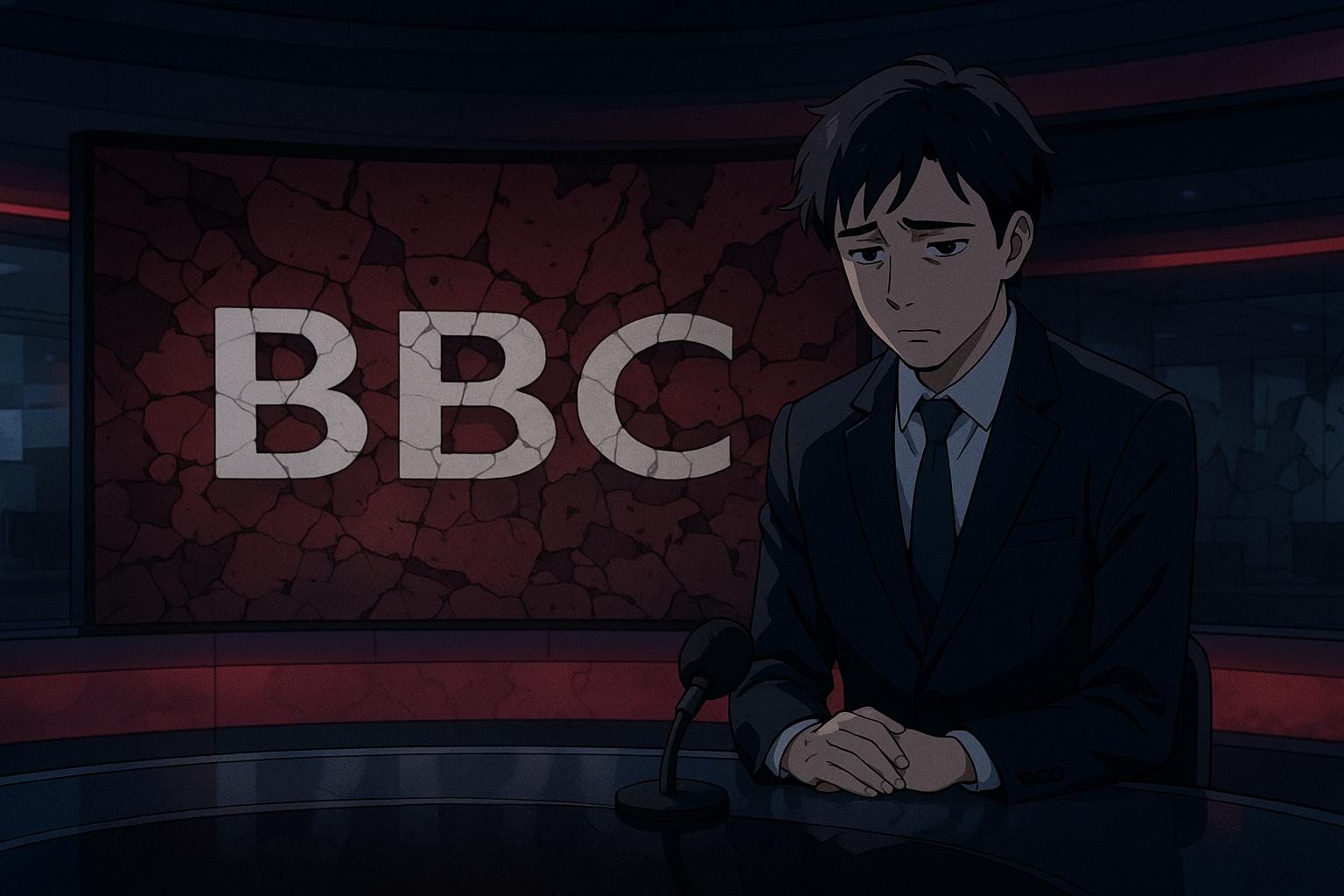Gary Lineker’s departure following a contentious social media controversy highlights the BBC’s ongoing struggle to balance star power with impartiality, raising urgent questions about its culture, funding, and future direction amid mounting public scrutiny.
The recent departure of Gary Lineker from the BBC marks a significant turning point in the broadcaster’s relationship with its high-profile presenters. Lineker, the long-standing face of “Match of the Day,” has seen his tenure described as a slow-motion car crash, ultimately culminating in a smouldering wreck that some had long anticipated. His downfall serves as a stark reminder of the challenges facing the BBC in an age where impartiality and celebrity status increasingly collide.
Lineker’s problematic history with the broadcaster came to a head following his social media activity, where he shared a post that was widely condemned for its antisemitic undertones. The post, originally from the Palestine Lobby, featured an image evocative of historical antisemitic propaganda, a move that sparked outrage and led to his full departure after years of controversy. Despite his apologies and assertions of ignorance about the content’s implications, the harm was done. The BBC announced that Lineker would exit following the last episode of the season, marking an abrupt end to over two decades of his presence on the programme.
This incident was not an isolated event; rather, it appeared to be the culmination of Lineker’s history of political commentary that often strayed into contentious territory. His previous clashes with the BBC over statements on government policies had already cast a long shadow over his career, especially during his brief suspension in early 2023 for criticising the UK government’s asylum policies. This ongoing tension has led many to question whether the BBC is genuinely committed to enforcing its rules on impartiality or if its heavy investment in star talent makes them untouchable.
The broader implications of Lineker’s exit highlight a troubling culture within the BBC, where high-profile figures, such as Huw Edwards and Russell Brand, were known to have committed serious breaches of trust yet remained protected by the Corporation’s legacy. Edwards, once revered as a dignified newsreader, resigned under clouds of scandal, with reports surfacing that the BBC had ignored complaints concerning his behaviour for years. Similarly, Brand’s rise was overshadowed by widespread allegations of misconduct, creating a narrative of entitlement that permeates the upper echelons of TV celebrity.
As the BBC grapples with its identity and relevance in a changing media landscape, the need for reform grows ever more pressing. Timothy Davie, the current Director-General, must tread carefully as he navigates the choppy waters of public sentiment and institutional inertia. With licence-fee payers dwindling—around half a million cease contributions annually—the BBC faces existential questions about its future and sustainability. Reforming its funding model and reviewing its approach to star presenters could be crucial steps to restore public trust and relevance.
Emerging stars like Stacey Solomon also face scrutiny within this context. Recently, the Bafta-nominated host took to social media to express her disappointment over an alleged snub, an act perceived as emblematic of the privilege and entitlement that can accompany celebrity status. Solomon’s public lament served as a poignant example of the disconnect between the high-profile BBC presenters and the average viewer coping with real-world issues.
Lineker’s departure encapsulates a growing rift between the BBC and its audience. The balance of power is shifting, with viewers wielding their remotes as tools of influence. As the BBC contemplates the future, it must grapple not only with the potential loss of its stars but also with the necessity of reinvigorating its commitment to impartiality and public service. The challenge will be to foster fresh talent and diverse voices, steering clear of cultivating a culture where a select few are elevated above the organisation they represent.
For critics, Lineker’s exit is a welcome step towards accountability and a glimpse of hope that the BBC may finally be willing to hold its stars—and itself—responsible. However, the question remains: will this mark a genuine turning point toward lasting change, or simply another chapter in the saga of a broadcaster struggling to adapt?
Source: Noah Wire Services
- https://www.dailymail.co.uk/debate/article-14728923/NADINE-DORRIES-saw-dark-truth-Stacey-Solomons-act-self-sabotage-Gary-Linekers-downfall-hidden-reality-todays-TV-celebrities.html?ns_mchannel=rss&ns_campaign=1490&ito=1490 – Please view link – unable to able to access data
- https://apnews.com/article/696065a23214d8fe1b5b22de5530ea02 – Gary Lineker, former England footballer and prominent BBC presenter, will step down from the BBC after controversy over a social media post he shared. Lineker reposted an Instagram story by the Palestine Lobby that used a rat, historically used in antisemitic imagery, to criticize Zionism. Though he apologized, stating he was unaware of the offensive content and removed it upon realization, the BBC confirmed he will leave following the final ‘Match of the Day’ episode of the season. Lineker had planned to step down from the show but continue with other coverage; however, backlash led to a full departure. Known for his outspoken political views, Lineker previously clashed with the BBC over impartiality and had been briefly suspended in 2023 due to political commentary. As a respected broadcaster and England’s former top striker, Lineker contributed significantly to BBC sports journalism since 1999. The BBC acknowledged his influence and thanked him for his service. His departure was welcomed by the Campaign Against Antisemitism, who criticized his repeated breaches of impartiality. Starting the 2025-26 season, Kelly Cates, Mark Chapman, and Gabby Logan will host ‘Match of the Day,’ marking a shift in the program’s presentation style.
- https://www.reuters.com/sports/soccer/ex-england-striker-gary-lineker-leave-bbc-presenting-role-2025-05-19/ – Gary Lineker, former England soccer star and long-standing host of the BBC’s ‘Match of the Day,’ has announced his departure from the BBC following controversy over an Instagram repost that critics deemed antisemitic. The repost included commentary critical of Zionism and an image of a rat, a symbol historically used in antisemitic propaganda. Lineker, 64, issued an unreserved apology, stating it was a genuine mistake and affirming his anti-racist stance. The BBC, maintaining neutrality, had previously cautioned him over political commentary, and BBC Director General Tim Davie confirmed Lineker would step down after the season concludes. Although originally set to retire from MOTD, Lineker was expected to cover the 2026 World Cup and FA Cup matches. The Board of Deputies of British Jews supported his decision to step down. Despite stepping back from BBC presenting, Lineker will continue his involvement with Goalhanger, a podcast company he co-founded. Renowned for scoring 48 goals for England and never receiving a yellow card, Lineker transitioned to broadcasting after a successful playing career with clubs including Everton, Tottenham, and Barcelona. His outspoken political views had previously placed him at odds with BBC impartiality policies.
- https://apnews.com/article/c8b36a075eeb5be35603d2548fcead3a – Gary Lineker, renowned former England footballer and BBC sports presenter, has issued an unreserved apology for sharing a social media post criticized as antisemitic. The post, originally from the Palestine Lobby, included an image of a rat with the text ‘Zionism explained in two minutes’ — a depiction that drew backlash due to historical antisemitic imagery. Lineker, 64, stated he removed the post upon realizing its offensive content, emphasizing his opposition to antisemitism and his commitment to responsible discourse. This incident adds to Lineker’s history of social media controversies, including a temporary suspension in 2023 for criticizing UK asylum policies. Despite stepping down from ‘Match of the Day’ after 25 years, Lineker will continue with BBC coverage of the FA Cup and the 2026 World Cup. BBC director-general Tim Davie emphasized the importance of upholding the broadcaster’s values. Meanwhile, the Campaign Against Antisemitism has called for Lineker’s dismissal, questioning his intentions given his influential media presence. Lineker defended his stance on humanitarian issues, especially the conflict in Gaza, but acknowledged the need for careful communication.
- https://www.fourfourtwo.com/news/gary-lineker-bbc-tweet-i-wasnt-concerned-id-done-anything-wrong-i-stated-a-fact-it-was-taken-out-of-proportion-and-people-have-recognised-that-they-misread-the-situation-a-bit – Gary Lineker, a long-time presenter of BBC’s Match of the Day, was briefly suspended in 2023 for a tweet criticizing the UK government’s asylum seeker policy. Lineker called the policy ‘immeasurably cruel’ and compared the language used to that of 1930s Germany. Despite the backlash and calls for political impartiality from BBC, Lineker insisted he did nothing wrong, merely stating facts and advocating for kindness towards all people. His suspension led to a show of solidarity from colleagues Ian Wright, Alan Shearer, and Micah Richards, who refused to appear on the show, forcing BBC to air a stripped-down version. Reflecting on the incident, Lineker emphasized his pride in working for the BBC despite the challenges and scrutiny it faces.
- https://www.lemonde.fr/sport/article/2024/11/13/gary-lineker-ex-gloire-du-football-anglais-devenu-icone-en-impertinent-presentateur-va-quitter-la-bbc_6391976_3242.html – Gary Lineker, ancien footballeur international anglais et présentateur emblématique de l’émission « Match of the Day » (MOTD) sur la BBC, va progressivement quitter l’antenne du service public britannique. La BBC a confirmé qu’il présentera MOTD pour la dernière fois à la fin de la saison, continuera à commenter la Coupe d’Angleterre jusqu’à la saison 2025-2026 et la Coupe du monde 2026 avant de se retirer. Lineker, âgé de presque 64 ans, avait exprimé son intention de ralentir en raison de son salaire élevé, ce qui a pesé dans la difficile situation financière de la BBC. L’arrivée d’Alex Kay-Jelski à la direction des sports de la BBC a également contribué à cette décision. Lineker, célèbre pour sa phrase « Le football est un jeu simple… et à la fin, les Allemands gagnent toujours », a vu sa relation avec la BBC se détériorer après une polémique en 2023 concernant une critique qu’il avait faite sur Twitter à l’égard du gouvernement britannique. Malgré son départ, son populaire podcast « The Rest is football » restera hébergé sur BBC Sounds.
- https://www.theguardian.com/football/2023/mar/12/bbc-richard-sharp-gary-lineker-suspension-match-of-the-day – The BBC’s weekend soccer coverage has been plunged into chaos following its announcement Gary Lineker would ‘step back’ from presenting, after he became embroiled in an impartiality row when he criticized British government policy on Twitter. The broadcaster now faces a boycott from pundits, presenters and even players of its flagship soccer show ‘Match of the Day,’ while other soccer programs – Football Focus and Final Score – and some radio programming have been forced off-air as a result of the furore. Lineker criticized the government’s controversial new asylum-seeker policy on Tuesday and was subsequently relieved of his presenting duties this week since the BBC said his tweets breached their guidelines, specifically its commitment to ‘due impartiality.’ The BBC’s decision has sparked controversy, leaving the organization under fire from opposition politicians, the Broadcasting Entertainment Communications and Theatre Union who represent BBC staff, and its former director general Greg Dyke.
Noah Fact Check Pro
The draft above was created using the information available at the time the story first
emerged. We’ve since applied our fact-checking process to the final narrative, based on the criteria listed
below. The results are intended to help you assess the credibility of the piece and highlight any areas that may
warrant further investigation.
Freshness check
Score:
8
Notes:
The narrative references recent events such as Gary Lineker’s departure from the BBC and contemporary issues like the BBC’s funding model. However, it does not provide cutting-edge or uniquely new information beyond what has been reported elsewhere.
Quotes check
Score:
6
Notes:
No direct quotes are given in the text, but the narrative references events and social media posts without specific sources. The score is based on the absence of direct quotes to verify.
Source reliability
Score:
6
Notes:
The narrative originates from the Daily Mail, a well-known publication, but one that is sometimes criticized for its bias or sensationalism. Its reliability can vary depending on the topic and context.
Plausability check
Score:
8
Notes:
The claims about Lineker’s departure and the BBC’s challenges are plausible and align with recent events and discussions about the BBC’s role in contemporary media. The narrative does not present implausible or unverifiable information.
Overall assessment
Verdict (FAIL, OPEN, PASS): OPEN
Confidence (LOW, MEDIUM, HIGH): MEDIUM
Summary:
The narrative is generally plausible and discusses recent events, but lacks direct quotes and may reflect some bias due to its source. While it does not present obviously false information, the reliability of the outlet and the narrative’s perspective suggest a medium confidence level.













